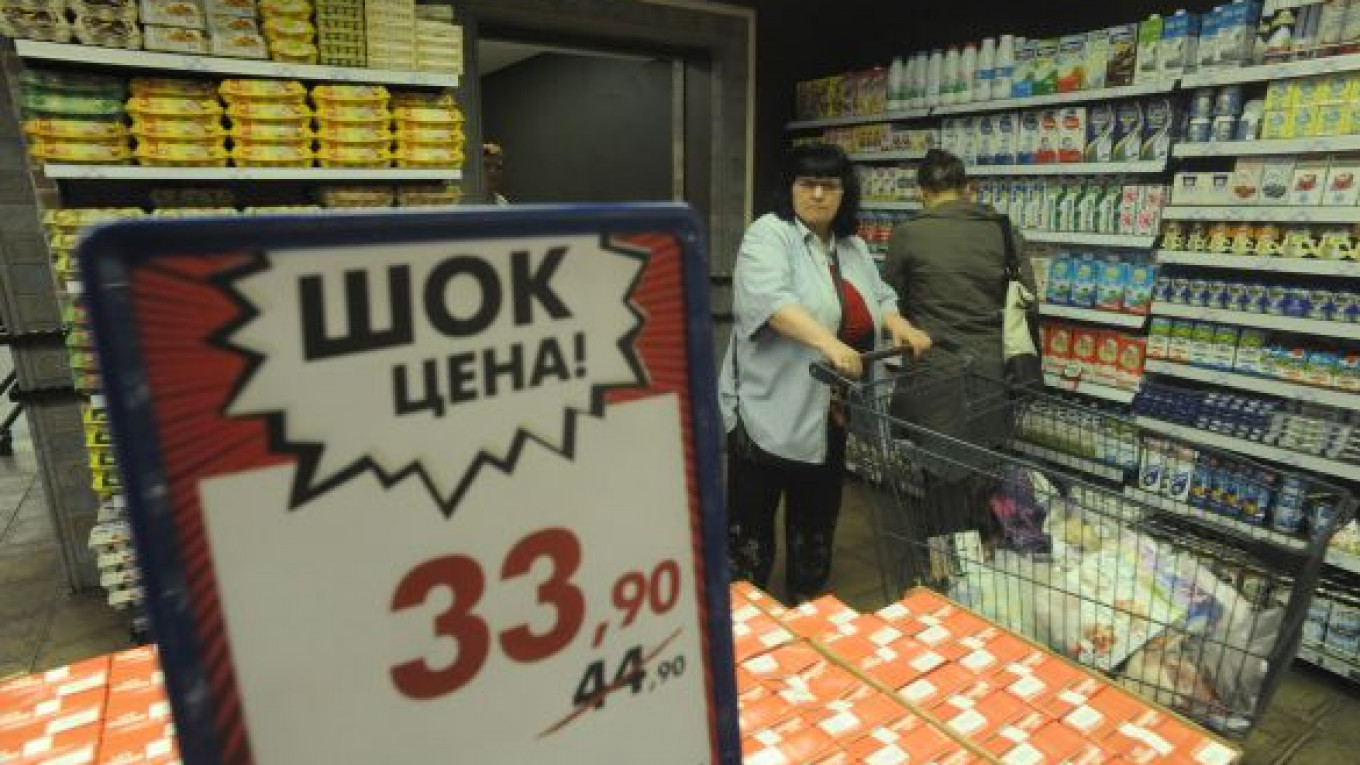Russians were promised lower prices when the country joined the World Trade Organization, but one year on prices continue to rise — at least for consumers.
Increased competition from WTO members is lowering wholesale prices and putting huge pressure on domestic producers, but consumers continue to pay the same or more for their products because of the monopolies held by retailers in their market segments. These were the conclusions of the annual monitoring report that the Public Chamber, an elected citizen group that aims to influence state policies, presented Thursday.
"One of the motives for the WTO accession was to lower prices for consumers. There has been no such effect," said Mikhail Popov, head of the Public Chamber's agriculture working group. "There is one single reason for this: Retail competition is insufficient."
Prices on food products, medicine, car maintenance and utility services have jumped 43 percent since May 2010, according to the report. Bread prices have increased by 20 percent over the last year; dairy products by 12 percent and potatoes by 55 percent.
The general trend is that when wholesale prices increase, so do retail prices, but when wholesale prices fall, retail prices stay the same or continue to increase, the report shows.
While consumers feel no benefits from increased competition, WTO membership is throwing down the gauntlet to Russian producers.
For example, the wholesale pork prices fell by 26 percent over the last year, yet retail prices only fell 6 percent. Meanwhile, increasing WTO imports will cost pork suppliers up to 40 billion rubles ($1.2 billion) each year, according to the Public Chamber.
Milk producers have also been hit. Imports of dairy products rose by 20 percent last year to about 9 million tons, equivalent to a 30-billion ruble loss for Russian producers, largely as a result of the WTO accession.
"[Local dairy producers] are not competitive in the Customs Union and especially in the WTO," said Andrei Danilenko, chairman of the National Union of Dairy Producers. "This year alone, we have lost so great a volume in milk production that we will fall back to 2005 levels by 2014."
Danilenko predicted that consumers will pay 10 percent extra for dairy products by the end of this year. Not wishing to scare consumers with higher prices, more producers will opt to supplement their dairy products with cheaper milk substitutes, such as palm oil, he added.
Ten to 30 percent of dairy products currently on the shelves are already doctored in this way.
The mismatch between wholesale and retail price movement is also evident in the grain sector. Prices fell from 11,500 rubles per ton in February to 6,500 rubles per ton at the end of July, yet bread prices continue to rise, said Arkady Zlochevsky, president of the Russian Grain Union.
Contact the author at e.smirnova@imedia.ru
Related articles:
A Message from The Moscow Times:
Dear readers,
We are facing unprecedented challenges. Russia's Prosecutor General's Office has designated The Moscow Times as an "undesirable" organization, criminalizing our work and putting our staff at risk of prosecution. This follows our earlier unjust labeling as a "foreign agent."
These actions are direct attempts to silence independent journalism in Russia. The authorities claim our work "discredits the decisions of the Russian leadership." We see things differently: we strive to provide accurate, unbiased reporting on Russia.
We, the journalists of The Moscow Times, refuse to be silenced. But to continue our work, we need your help.
Your support, no matter how small, makes a world of difference. If you can, please support us monthly starting from just $2. It's quick to set up, and every contribution makes a significant impact.
By supporting The Moscow Times, you're defending open, independent journalism in the face of repression. Thank you for standing with us.
Remind me later.






